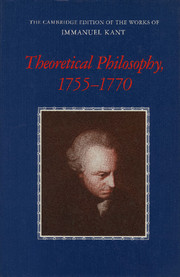Book contents
- Frontmatter
- Contents
- General editors' preface
- Preface
- Guide to abbreviations
- General introduction
- Introductions to the translations
- Résumés of the works
- A NEW ELUCIDATION OF THE FIRST PRINCIPLES OF METAPHYSICAL COGNITION (1755)
- THE EMPLOYMENT IN NATURAL PHILOSOPHY OF METAPHYSICS COMBINED WITH GEOMETRY, OF WHICH SAMPLE I CONTAINS THE PHYSICAL MONADOLOGY (1756)
- AN ATTEMPT AT SOME REFLECTIONS ON OPTIMISM (1759)
- THE FALSE SUBTLETY OF THE FOUR SYLLOGISTIC FIGURES (1762)
- THE ONLY POSSIBLE ARGUMENT IN SUPPORT OF A DEMONSTRATION OF THE EXISTENCE OF GOD (1763)
- ATTEMPT TO INTRODUCE THE CONCEPT OF NEGATIVE MAGNITUDES INTO PHILOSOPHY (1763)
- INQUIRY CONCERNING THE DISTINCTNESS OF THE PRINCIPLES OF NATURAL THEOLOGY AND MORALITY (1764)
- M. IMMANUEL KANT'S ANNOUNCEMENT OF THE PROGRAMME OF HIS LECTURES FOR THE WINTER SEMESTER 1765 — 1766 (1765)
- DREAMS OF A SPIRIT-SEER ELUCIDATED BY DREAMS OF METAPHYSICS (1766)
- CONCERNING THE ULTIMATE GROUND OF THE DIFFERENTIATION OF DIRECTIONS IN SPACE (1768)
- ON THE FORM AND PRINCIPLES OF THE SENSIBLE AND THE INTELLIGIBLE WORLD [INAUGURAL DISSERTATION] (1770)
- Section 1 On the concept of a world in general
- Section 2 On the distinction between sensible things and intelligible things in general
- Section 3 On the principles of the form of the sensible world
- Section 4 On the principle of the form of the intelligible world
- Section 5 On method in metaphysics concerning what is sensitive and what belongs to the understanding
- Factual notes
- Bibliographies of editions and translations
- Glossary
- Biographical-bibliographical sketches of persons mentioned by Kant
- Index
Section 3 - On the principles of the form of the sensible world
Published online by Cambridge University Press: 18 December 2014
- Frontmatter
- Contents
- General editors' preface
- Preface
- Guide to abbreviations
- General introduction
- Introductions to the translations
- Résumés of the works
- A NEW ELUCIDATION OF THE FIRST PRINCIPLES OF METAPHYSICAL COGNITION (1755)
- THE EMPLOYMENT IN NATURAL PHILOSOPHY OF METAPHYSICS COMBINED WITH GEOMETRY, OF WHICH SAMPLE I CONTAINS THE PHYSICAL MONADOLOGY (1756)
- AN ATTEMPT AT SOME REFLECTIONS ON OPTIMISM (1759)
- THE FALSE SUBTLETY OF THE FOUR SYLLOGISTIC FIGURES (1762)
- THE ONLY POSSIBLE ARGUMENT IN SUPPORT OF A DEMONSTRATION OF THE EXISTENCE OF GOD (1763)
- ATTEMPT TO INTRODUCE THE CONCEPT OF NEGATIVE MAGNITUDES INTO PHILOSOPHY (1763)
- INQUIRY CONCERNING THE DISTINCTNESS OF THE PRINCIPLES OF NATURAL THEOLOGY AND MORALITY (1764)
- M. IMMANUEL KANT'S ANNOUNCEMENT OF THE PROGRAMME OF HIS LECTURES FOR THE WINTER SEMESTER 1765 — 1766 (1765)
- DREAMS OF A SPIRIT-SEER ELUCIDATED BY DREAMS OF METAPHYSICS (1766)
- CONCERNING THE ULTIMATE GROUND OF THE DIFFERENTIATION OF DIRECTIONS IN SPACE (1768)
- ON THE FORM AND PRINCIPLES OF THE SENSIBLE AND THE INTELLIGIBLE WORLD [INAUGURAL DISSERTATION] (1770)
- Section 1 On the concept of a world in general
- Section 2 On the distinction between sensible things and intelligible things in general
- Section 3 On the principles of the form of the sensible world
- Section 4 On the principle of the form of the intelligible world
- Section 5 On method in metaphysics concerning what is sensitive and what belongs to the understanding
- Factual notes
- Bibliographies of editions and translations
- Glossary
- Biographical-bibliographical sketches of persons mentioned by Kant
- Index
Summary
§13
The principle of the form of the universe is that which contains the ground of the universal connection, in virtue of which all substances and their states belong to the same whole which is called a world. The principle of the form of the sensible world is that which contains the ground of the universal connection of all things, in so far as they are phenomena. The form of the intelligible world recognises an objective principle, that is to say, some cause in virtue of which there is a combining together of the things which exist in themselves. But the world, in so far as it is regarded as phenomenon, that is to say, the world in relation to the sensibility of the human mind, does not recognise any other principle of form than a subjective one, that is to say, a fixed law of the mind, in virtue of which it is necessary that all the things which can be objects of the senses (through the qualities of those objects) are seen as necessarily belonging to the same whole. Accordingly, whatever the principle of the form of the sensible world may, in the end, be, its embrace is limited to actual things, in so far as they are thought capable of falling under the senses. Accordingly, it embraces neither immaterial substances, which are already as such, by definition, excluded from the outer senses, nor the cause of the world, for, since it is in virtue of that cause that mind itself exists and is active through all its senses, that cause cannot be an object of the senses. These formal principles of the phenomenal universe are absolutely primary and universal; they are, so to speak, the schemata and conditions of everything sensitive in human cognition. I shall now show that there are two such principles, namely, space and time.
- Type
- Chapter
- Information
- Theoretical Philosophy, 1755–1770 , pp. 391 - 400Publisher: Cambridge University PressPrint publication year: 1992
- 2
- Cited by

